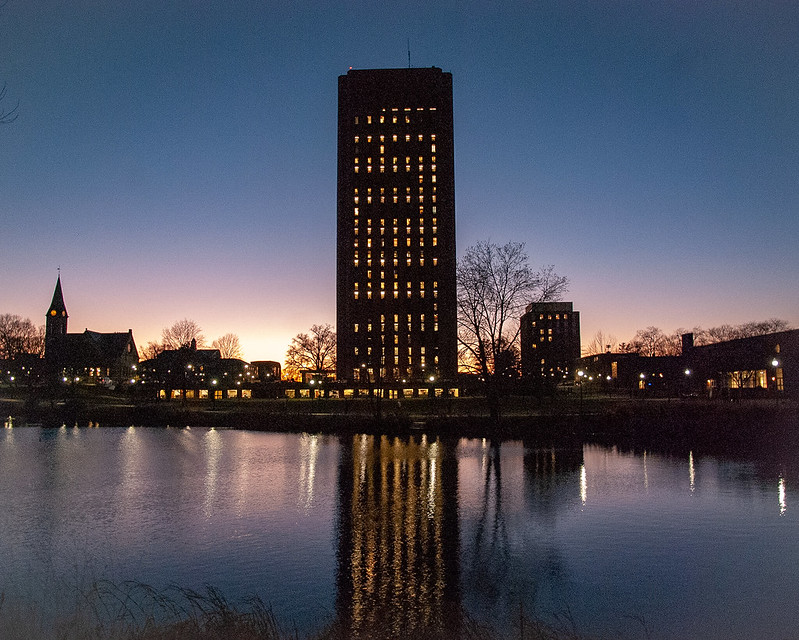I took a deep breath, steeling myself before looking my suitemate in the eyes and saying the fateful words: “I really need to do laundry. Like, tonight.” After a long pause, she solemnly agreed and grabbed her overflowing basket from her bedroom.
Like many of our peers, we tend to wait as long as possible before doing our laundry, which at the University of Massachusetts, Amherst is neither an easy nor cheap affair. I’ve heard it equated to a workout, a battle or a tough final – if you had to spend $3.00 each time you went to war. This being the case, many students bide their time, waiting until all that’s left to wear is an old hoodie from their summer job before descending upon the dorm laundry facilities with bulging laundry hampers. Those who have fewer clothes rack up their laundry bill faster than those with more – $3.00 adds up quickly with more frequent laundry days.
It’s a Wednesday night after a long weekend, so we are not expecting the laundry room to be too busy. Out of six machines, there are two open washers when we get down there; one of which has been broken all year and one that is newly broken. Neither are usable. Someone who got there before us is taking some poor soul’s abandoned laundry out of the washer so he can use it. I make a mental reminder to make sure I set my laundry alarm. We wait for the next two open machines, taking advantage of McNamara Hall’s basement study rooms in the meantime.
After twenty minutes, the machines we’re waiting for finally open up. A moldy smell hits me when I open the door, but it won’t stop me from washing my clothes. I pull up the flaps, just out of curiosity, and there’s a massive, soggy clump of hair, a gum wrapper and a Q-Tip. This, unfortunately, also can’t stop me. My laundry needs to get done, and I do not have a car to take myself to a laundromat. As much as it’s to my dismay, the dorms are my only choice. Various laundromats in Amherst offer pickup services, but those are more expensive than the dorm and I prefer to be in charge of my laundry. I would not want to part with my clothes for so long. I load the machine up, pay with my UCard and set my timer.
When our timers go off, my roommate and I return to the laundry room, hearing from down the hall a girl cheering on her friend. I love the sound of girls supporting girls and can’t help but smile when I see a girl on her knees, trying to fit all of her clothes into the washing machine, her friend standing behind her offering words of encouragement. It’s a lost cause and she settles for paying for two loads. There are signs that say not to overfill the washers, but the font is small and easy to miss, and most students value their $1.50 over a broken machine.
There are also signs that say to remove your lint from the dryer, in even smaller font that I had never noticed before until I specifically looked for it. Obviously, I had to remove someone else’s lint before putting my clothes in the dryer, paying and starting the cycle. This part is always the sweetest; all that’s left is waiting, folding, putting away and hang-drying all your clothes that the dryer didn’t properly dry. Easy enough and cheaper than paying for another load, I suppose.
The day after I did laundry, another one of my roommates endeavored to do her own, lamenting the time it took out of her day. The washers take a half hour and the dryers 55 minutes but with the time spent waiting for machines to open up, waiting for the elevator, navigating the “pay by UCard” kiosk and possibly running an extra dryer cycle to fully dry your clothes, a significant chunk of your day ends up dedicated to doing laundry. When I asked her what UMass could do to improve her laundry experience, she said they could “make it free.” She transferred to UMass Amherst from Framingham State University, where she said they made laundry free halfway through the year after getting new machines. “The students couldn’t afford it,” she explained, and they benefited from the new free machines.
Like her, I too transferred from a different school, where laundry was free the entire year. While laundry day was still not my favorite in the world, I never found myself dreading it or putting it off for as long as I do here. Much of this was because it was free, but also because it was cleaner. We had big signs stating to leave the washer doors open to prevent mold from growing and a sign over every dryer reminding users to remove the lint (which still only worked half the time, but that’s better than nothing).
I recently had to explain to my 4-year-old cousin that my white socks were pink because I didn’t sort my whites and colors; why would I pay for two loads and take up two machines when everything fits in one? When I do laundry, I don’t want to wait for one of the four machines for eight floors, because two are broken due to overfilling. I don’t want to walk into class wearing jeans that should have been washed last week and a T-shirt I don’t even remember bringing to school with me. My laundry experience should be worth what I’m paying for it and the only way UMass Amherst’s current laundry situation could be worth it is if it were free.
Piper Morgan can be reached at [email protected]







